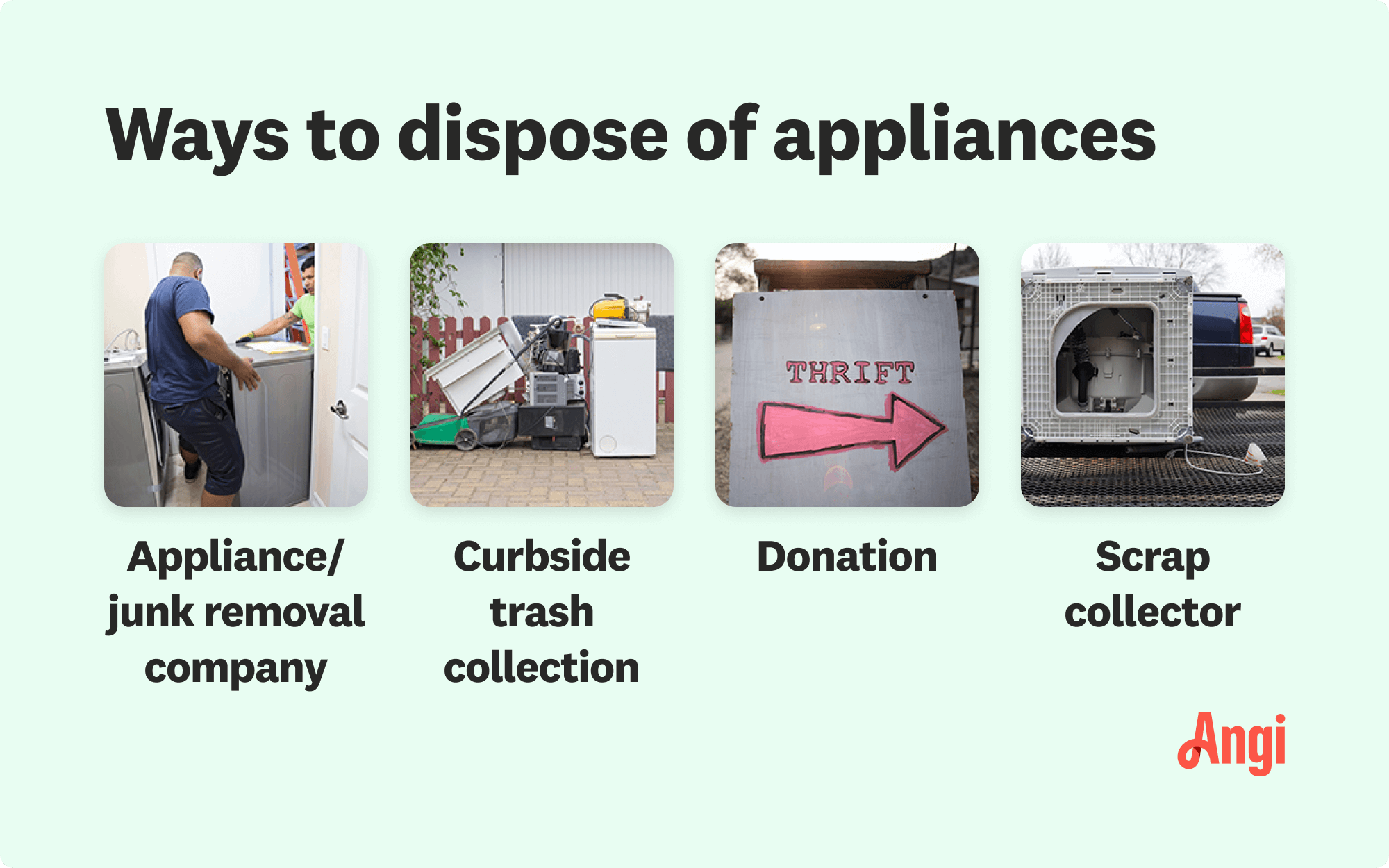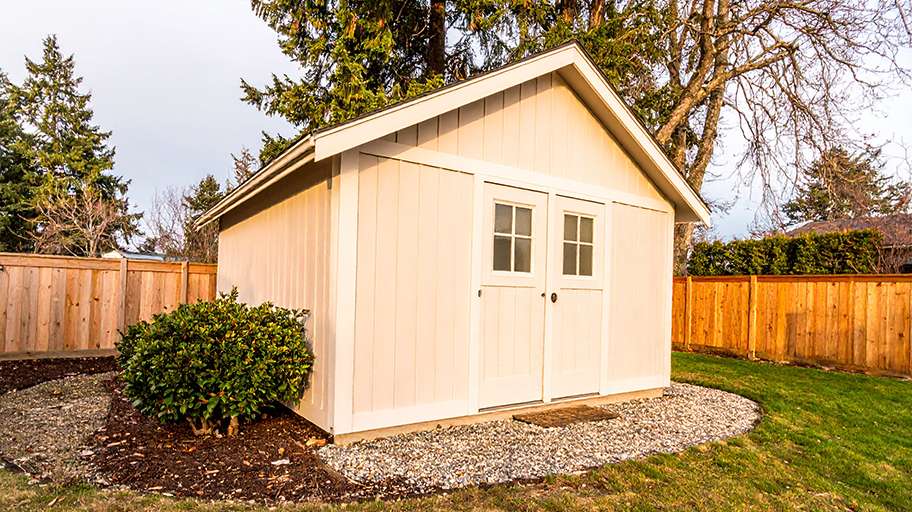
Junk removal costs depend on the volume and type of waste you need removed, but paying a professional saves you time and energy over hauling it yourself.
Appliance removal costs the average U.S. homeowner $100. Costs may range between $60 and $180, depending on the type and size of the appliance, additional disposal fees, and other costs.


Removing a refrigerator or washer can cost $100 to $250, while lighter items like microwaves or small AC units may only cost $50 to $100.
A single flight of basement stairs can raise costs by $25 to $75, and dense cities tend to charge more for appliance removal than smaller metros.
Appliances that use refrigerants carry EPA disposal fees for safe chemical removal, which can add $20 to $50 if billed separately.
If a junk removal crew is already on-site, adding extra items costs far less than scheduling separate visits. Many companies will remove multiple appliances for a flat rate under $300.
When it’s time to get rid of your old appliances, you can expect to pay an average of $100, with costs commonly ranging from $60 to $180. Disposing of old appliances, especially large ones, can pose logistical challenges for homeowners. Plus, local regulations often dictate where and how appliances can be disposed of.
Call an appliance removal company to haul away your old appliances safely and responsibly. This way, you can avoid the hassle and risk of moving a heavy appliance on your own.
The cost to remove an appliance depends on several factors. Since appliances often can’t be put in a dumpster rental, you’ll likely need to hire someone to remove and dispose of your old appliance. A local appliance removal company can give you a quote based on the type and size of the appliance, additional disposal fees, and where they’re removing the appliance from.
Different types of appliances have different removal costs. Some removal companies charge a flat fee depending on the type of appliance, while others will have a price range for each type.
| Appliance Type | Average Cost |
|---|---|
| Refrigerator | $50–$150 |
| Air conditioner | $50–$100 |
| Oven | $75–$150 |
| Washer or dryer | $100–$250 |
| Water heater | $100–$250 |
How you dispose of your appliances affects the cost. Some municipalities offer curbside appliance collection free of charge or for a small fee, so you’ll just need to get the item to the curb. Scrap collectors and non-profits may take your appliances for free. A junk removal company will charge a flat fee, although you may be able to get rid of additional items without paying more, depending on how the service is charged.

On average, it will cost more to have a large appliance removed than a small one. Larger appliances often require special equipment to remove or additional workers to maneuver them out of your house. If the appliance removal company doesn’t charge a flat fee by appliance type, they’ll likely charge by weight, so a heavier appliance will cost more to haul away.
Some appliances, like air conditioners, refrigerators, or microwaves, may cost extra to remove due to environmental disposal fees. The fees are often included in the removal price for certain appliances, but if the company charges by weight instead of appliance type, you may have to pay an additional charge.
Appliances that are difficult to access may cost more to remove. Washers and dryers that have to be carried up narrow basement stairs or extra-large appliances that don’t easily fit through your home’s doorways can incur extra labor costs. Let the appliance removal company know in advance if your appliance is in a hard-to-reach area.
If you’re disposing of your water heater, gas oven, dryer, or dishwasher, a plumber or electrician may need to disconnect the appliance before you can safely have it removed. These pros may charge a flat service fee to disconnect your appliance, and removal companies won’t take an appliance that hasn’t been safely disconnected before they arrive.
| Type of Connection | Average Cost to Disconnect |
|---|---|
| Electric | $50–$100 |
| Gas | $50–$100 |
| Water | $60–$140 |
Consider tipping the appliance removal workers $10 to $20 each. While this isn’t a mandatory cost, it’s a good way to show appreciation for exceptional work, particularly for jobs that require extra time, heavy lifting, or hard-to-reach areas.
Where you live can factor into how much you pay. If your municipality has higher disposal fees or if the disposal location is far from you, you’ll likely pay more. Appliance removal in cities with limited disposal space and harder-to-navigate streets and buildings will cost more, but remote or rural locations may also incur higher fees due to travel time and fuel costs.
| Location | Average Cost |
|---|---|
| Minneapolis, MN | $115 |
| New York, NY | $150 |
| Los Angeles, CA | $130 |
| Boulder, CO | $85 |
| Chicago, IL | $100 |
| Portland, OR | $100 |
| Richmond, VA | $95 |
| Austin, TX | $80 |
If you have a truck or other vehicle that can accommodate your old appliance and someone to lend an extra set of hands to help move it, you can bring it to the appropriate recycling station yourself. Expect to pay any disposal fees the facility charges, which can average between $10 and $50, depending on the item.
Hiring an appliance removal company to dispose of a refrigerator, oven, washer, or dryer is a great option if you don’t have a way to transport the appliance or it’s too big or heavy to move on your own. An appliance removal company will have a trained and insured team who’ll make sure your item is disposed of according to local guidelines. Hiring a pro will save you the time, hassle, and physical labor involved with getting rid of heavy, difficult-to-move appliances.
You can't just throw anything into a dumpster rental. Fluorescent light bulbs, paint, tires, household cleaners, and food waste are just a few commonly prohibited items. Ask dumpster rental companies what you can and can't throw into their dumpsters before renting.
Appliance removal companies often offer other junk removal services, so while they’re hauling away your old appliances, you may want to get rid of other large or hazardous items you no longer want.
| Item Type | Average Removal Cost |
|---|---|
| Mattresses | $75–$150 |
| Electronics | $10–$100 |
| Furniture | $75–$150 |
| Construction debris | $100–$800 |
| Paint cans | $5–$10 |
Disposing of old appliances can be a strain on your budget, but there are some wallet-friendly ways to remove old appliances for less.
If you’re replacing your old appliance with a new one, purchase the new appliance from a retailer that offers free or low-cost removal. Many stores include removal and disposal of your old appliance when you purchase a new one, so check the fine print when it comes time to buy.
In some areas, your municipality or private trash collection service may offer free or minimal-fee appliance disposal. You’ll have to set your appliance out for pickup, though, so removing and transporting it from your house to the curb will be a DIY job.
When you hire a removal company for one appliance, it may be less expensive to add additional appliances than to dispose of them all separately. If you have room to store appliances you no longer use, waiting until you have more than one to get rid of could be cost-effective.
If your appliance is still in working condition, consider donating it. Some nonprofits will pick up your old appliance free of charge, although you’ll probably need to get it outside for pickup first. Depending on the organization, you may even be able to write off your donation on your taxes, so remember to get a receipt.
Home is the most important place on earth, which is why Angi has helped more than 150 million homeowners transform their houses into homes they adore. To help homeowners with their next project, Angi provides readers with the most accurate cost data and upholds strict editorial standards. We extensively research project costs to develop the pricing data you see, so you can make the best decisions for you and your home. We rely on reputable sources, including the U.S. Bureau of Labor Statistics, academic journals, market studies, and interviews with industry experts—all to ensure our prices reflect real-world projects.
Want to help us improve our cost data? Send us a recent project quote to [email protected]. Quotes and personal information will not be shared publicly.
From average costs to expert advice, get all the answers you need to get your job done.

Junk removal costs depend on the volume and type of waste you need removed, but paying a professional saves you time and energy over hauling it yourself.

Furniture removal costs depend on the type, size, and location of items. Learn the average cost of furniture removal to free up room in your home.

Shed removal costs depend on size, materials, condition, and if you DIY the demolition or not. This guide will help you budget to remove your shed.

Ensure your old mattress is disposed of legally and responsibly by hiring a junk removal service.

Box springs are big, cumbersome, and downright annoying to get rid of. Here are the best ways to dispose of a box spring without too much frustration.

Getting rid of old concrete can be challenging, but you can tackle it with the right tools and methods. Learn how to break up concrete and remove it.